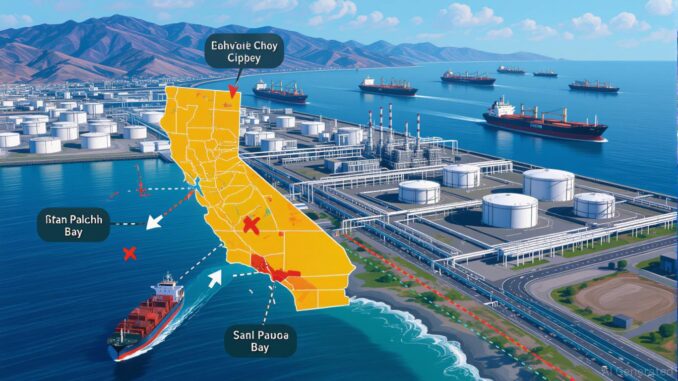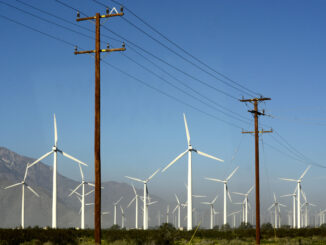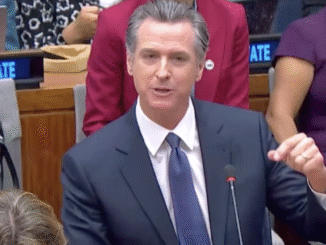
In a move that could exacerbate California’s already precarious energy landscape, the state’s largest inland oil pipeline is barreling toward a potential shutdown, threatening critical crude supplies to Bay Area refiners and underscoring the deepening national security risks tied to the Golden State’s faltering oil production. The San Pablo Bay Pipeline, operated by Crimson Midstream LLC, is losing $2 million a month and faces “severe financial distress,” according to a letter from Robert Waldron, CEO of parent company CorEngery Infrastructure Trust, to Governor Gavin Newsom’s office.
Without swift state approval for a rate increase and other relief measures, the pipeline could cease operations within months, forcing at least two San Francisco-area refiners to scramble for alternatives like increased crude imports.
Are you Paying High Taxes in New Jersey, New York, or California?
The pipeline plays a pivotal role in transporting oil from the prolific Bakersfield fields in the San Joaquin Valley to Northern California refineries, ensuring a steady flow of domestic crude that has long supported the region’s fuel needs. A shutdown would not only disrupt these shipments but also amplify California’s growing dependence on foreign oil, a trend that has seen the state import 65% of its crude from overseas sources—up dramatically from just 5% three to four decades ago, when local and Alaskan production met nearly all demand. This vulnerability comes at a time when California’s domestic oil output has plummeted to under 200,000 barrels per day from a peak of 1 million barrels 40 years ago, driven by stringent regulations that have slashed drilling permits from around 3,000 annually pre-Newsom to mere dozens in 2024, many of which are for maintenance rather than new exploration.
The ripple effects of the pipeline’s potential closure extend far beyond the refiners. Northern California could be left perilously short on fuel, with experts warning of gasoline shortages and panic buying reminiscent of past crises. The state’s refineries already operate on razor-thin margins, holding just 11-12 days of inventory, and are one earthquake or accident away from catastrophe—especially considering that one major facility sits on the earthquake-prone Hayward Fault. As Mike Umbro, podcast guest on Energy News Beat, notes in a recent analysis, “They’re either an earthquake or an accident away from a true crisis.” Compounding this, planned refinery closures like Valero’s Benicia plant in April 2026 and Phillips 66’s Wilmington facility will further erode processing capacity, leaving the state with limited options and heightening the risk of supply disruptions.
National security implications loom large in this unfolding drama.
California hosts 34 military bases that rely heavily on diesel and jet fuel, and with 40% of the nation’s imports flowing through its ports, any fuel shortfall could cascade into broader economic turmoil. The state’s shift toward imported oil includes shipments from adversarial nations like Russia and Iran—sometimes rerouted through intermediaries such as Malaysia—undermining U.S. energy independence at a moment when global tensions are high. As independent analyst Doomberg observes, “How much oil the U.S. produces is a political choice,” pointing to California’s stifled development that could have mirrored Texas’s energy boom if not for regulatory overreach. Umbro echoes this sentiment, questioning, “How can President Trump fix inflation without fixing California?” and calling for decisive action against climate NGOs that file lawsuits to halt projects.
This pipeline predicament is just the latest symptom of California’s mismanaged energy policies, which prioritize aggressive green mandates over reliable supply. The state’s electric vehicle push—mandating 51% EVs by 2026 and 100% by 2035—currently lags at 20% adoption, while logistics giants have threatened exodus over zero-emission truck rules, only recently paused under federal pressure. With California producing 14% of the nation’s food and leading in dairy, transportation cost spikes from fuel shortages could inflate prices nationwide, turning a state-level issue into a federal crisis.
As the clock ticks on the San Pablo Bay Pipeline, calls grow for federal intervention to overhaul permitting and protect critical infrastructure. Without it, California’s energy woes risk evolving from a regional headache into a national security nightmare, jeopardizing not just Bay Area refiners but the very foundation of U.S. energy dominance. Energy News Beat will continue monitoring this story as developments unfold.
Avoid Paying Taxes in 2025
Crude Oil, LNG, Jet Fuel price quote
ENB Top News
ENB
Energy Dashboard
ENB Podcast
ENB Substack






